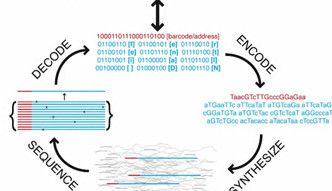All Data Humanity Creates in a Year Stored on 4 Grams of DNA
on

Data storage is becoming increasingly important as digital information doubles in volume roughly every two years. By the end of 2012 the volume will have grown 48% compared to 2011, the International Data Corporation (IDC) predicts.
Bioengineers have been jealously eyeballing nature’s information storage medium DNA for its efficiency and robustness.
Information stored in DNA can survive for a hundreds of thousand of years. Unlike data centers, DNA doesn’t need climate-control because it can withstand just about any environmental circumstance. As long as the data isn’t accessed there is no energy cost. And above all it has an extremely high storage density.
Now Harvard researchers report a major breakthrough. They have successfully encoded the contents of a book in DNA, copied it 70 billion times and fitted it on a space the size of a thumbnail.


Discussion (0 comments)